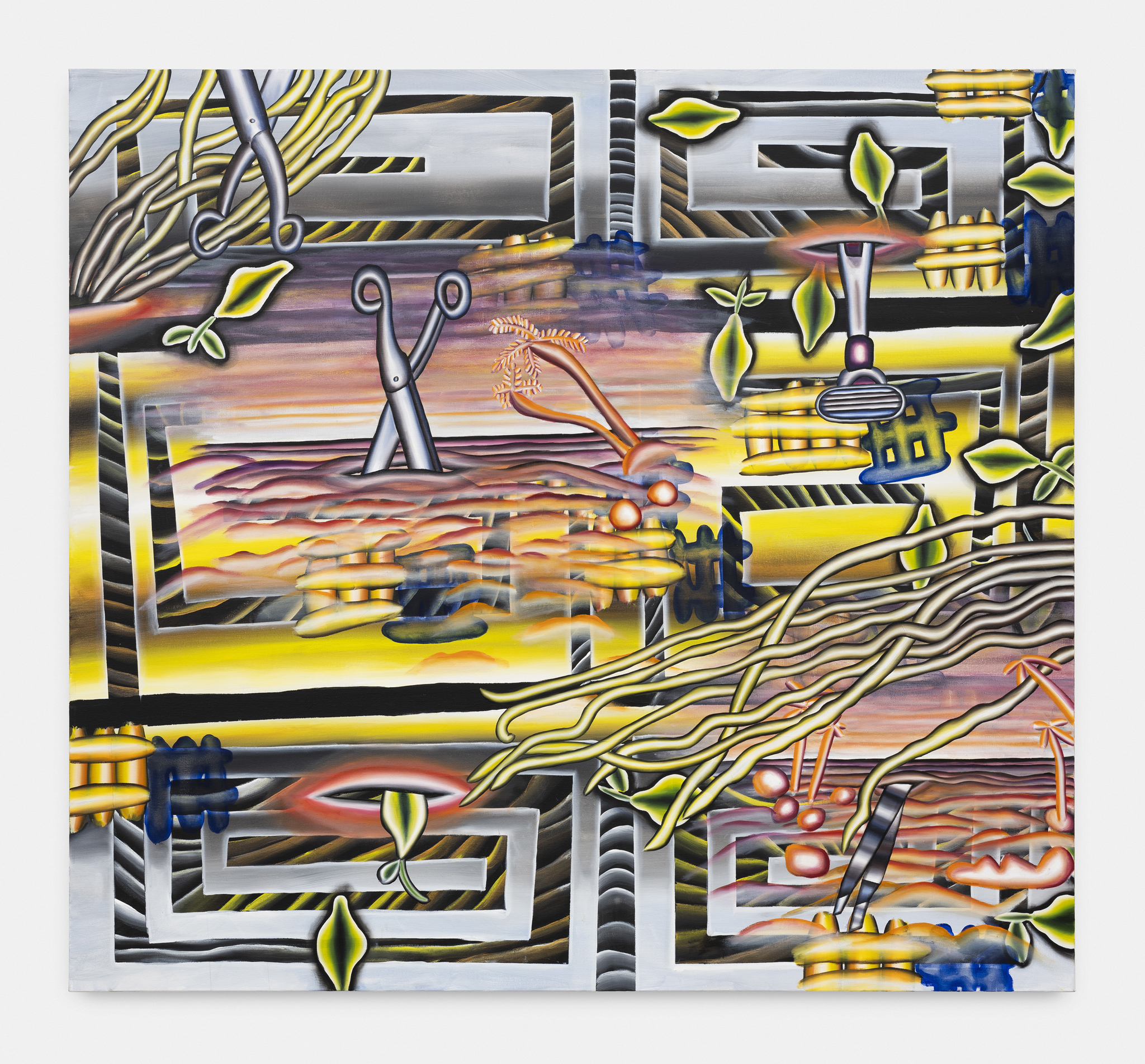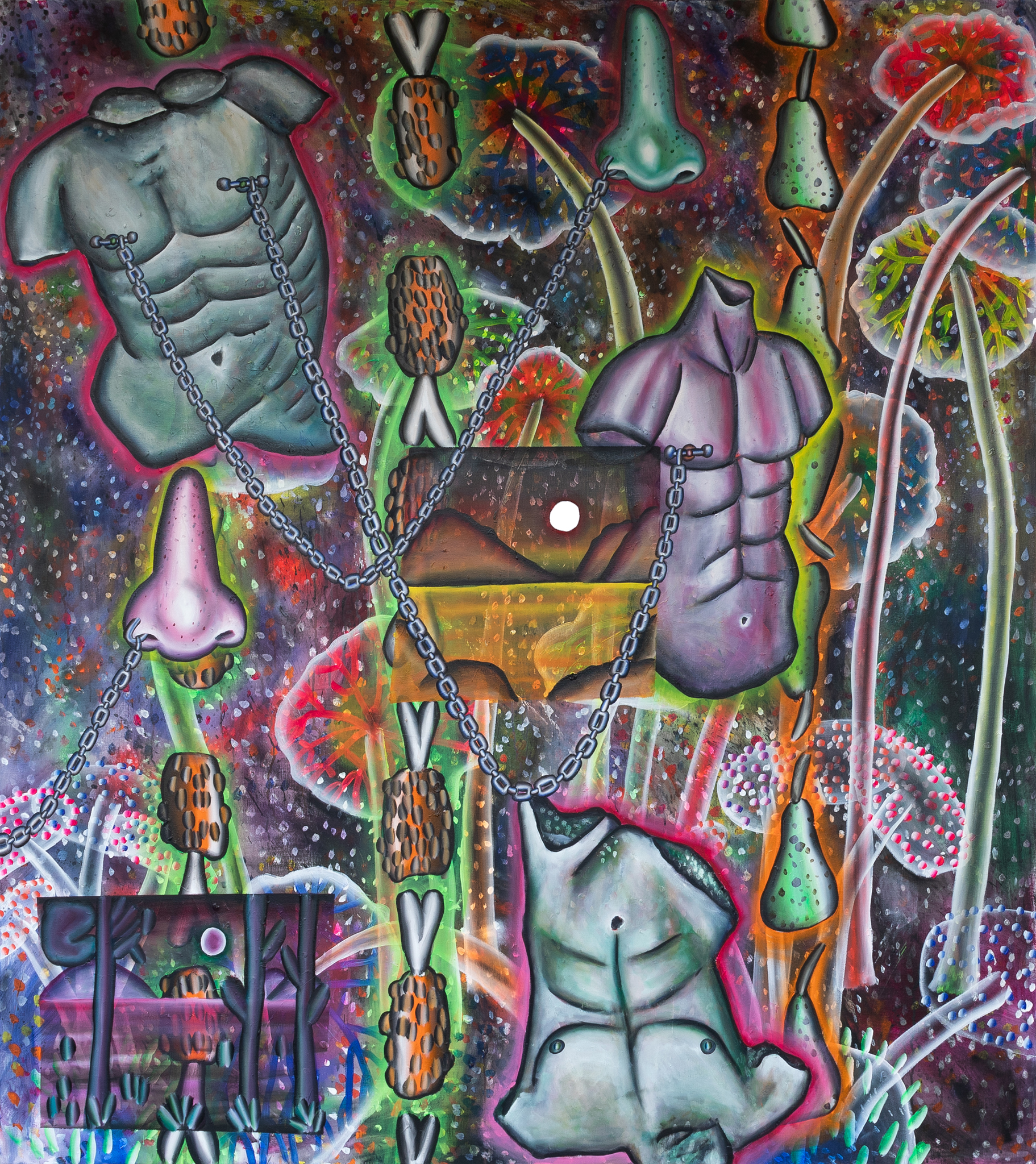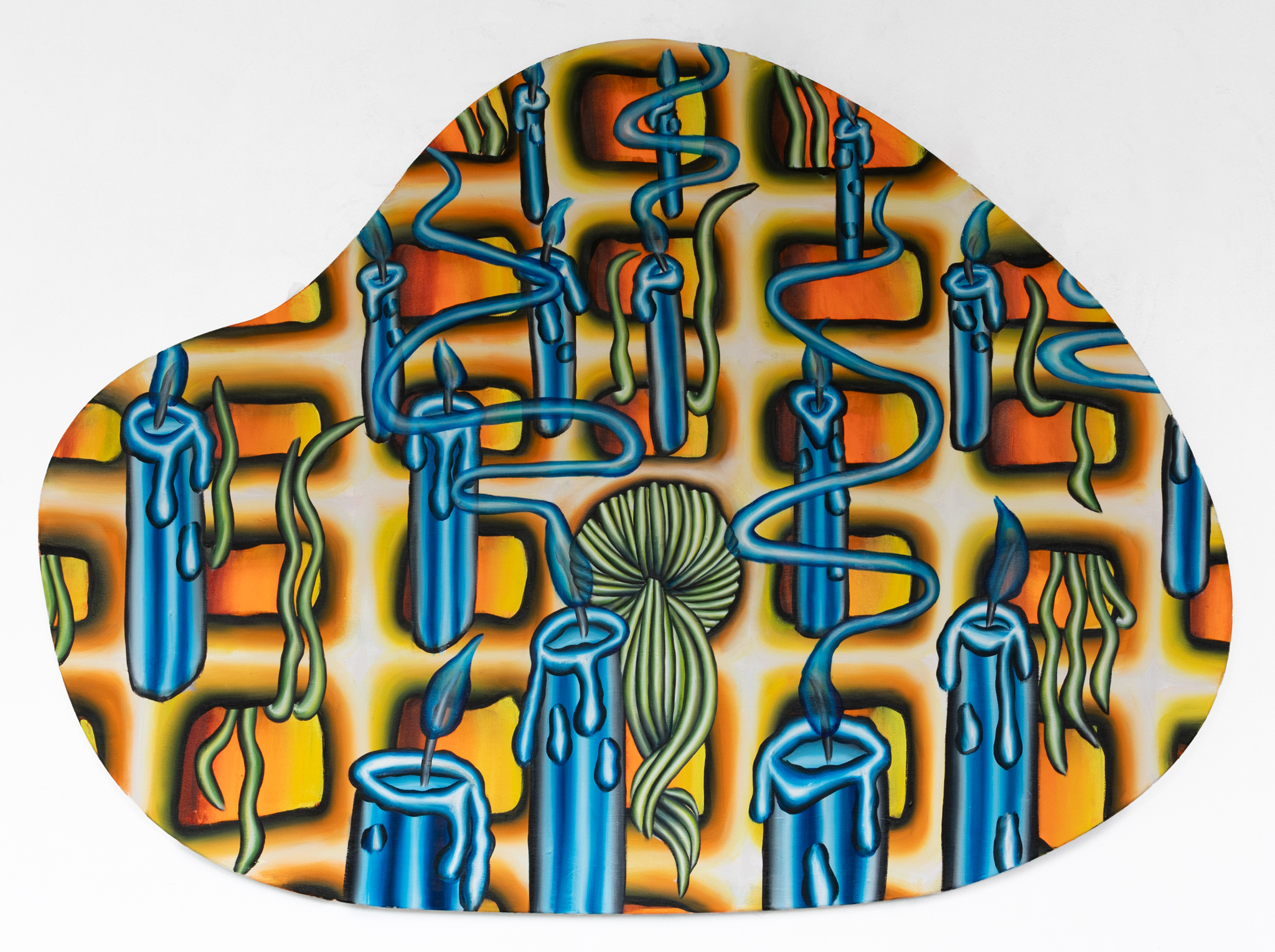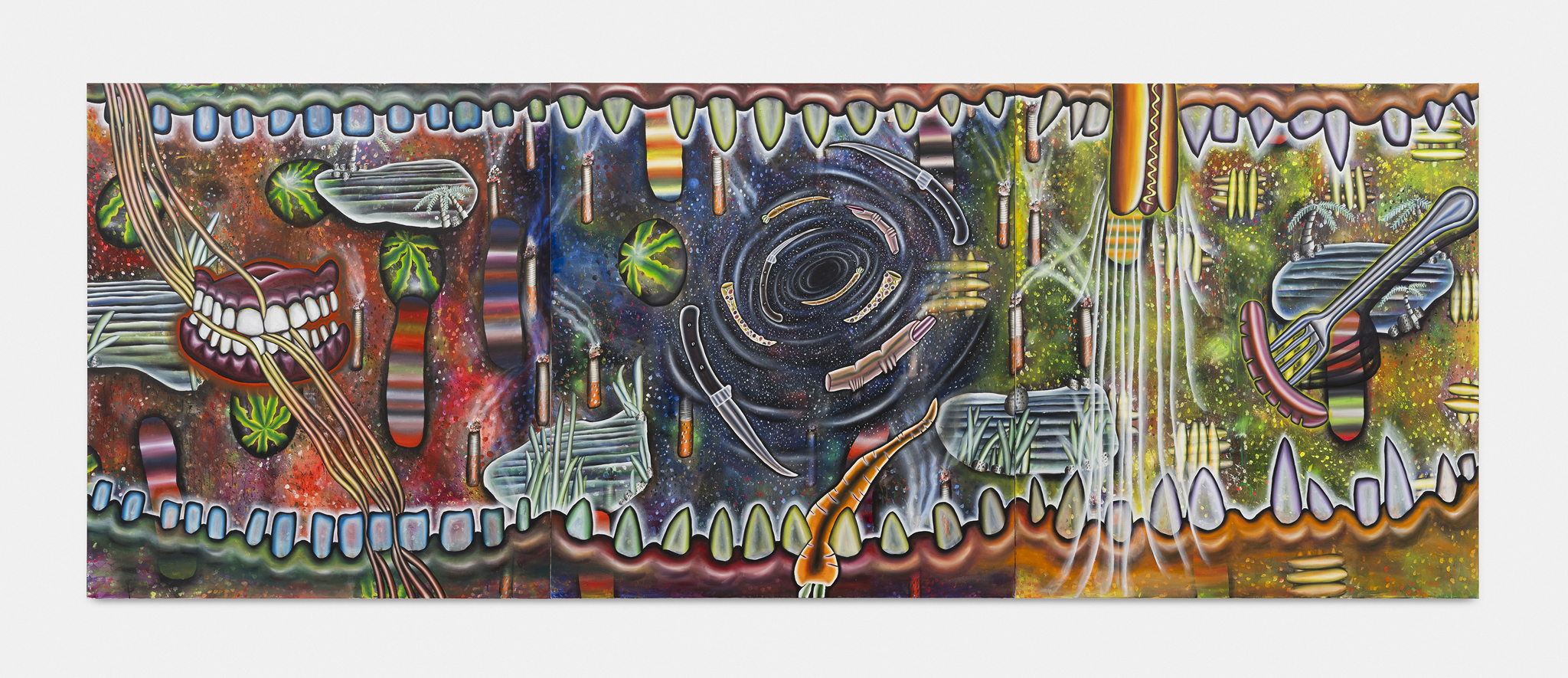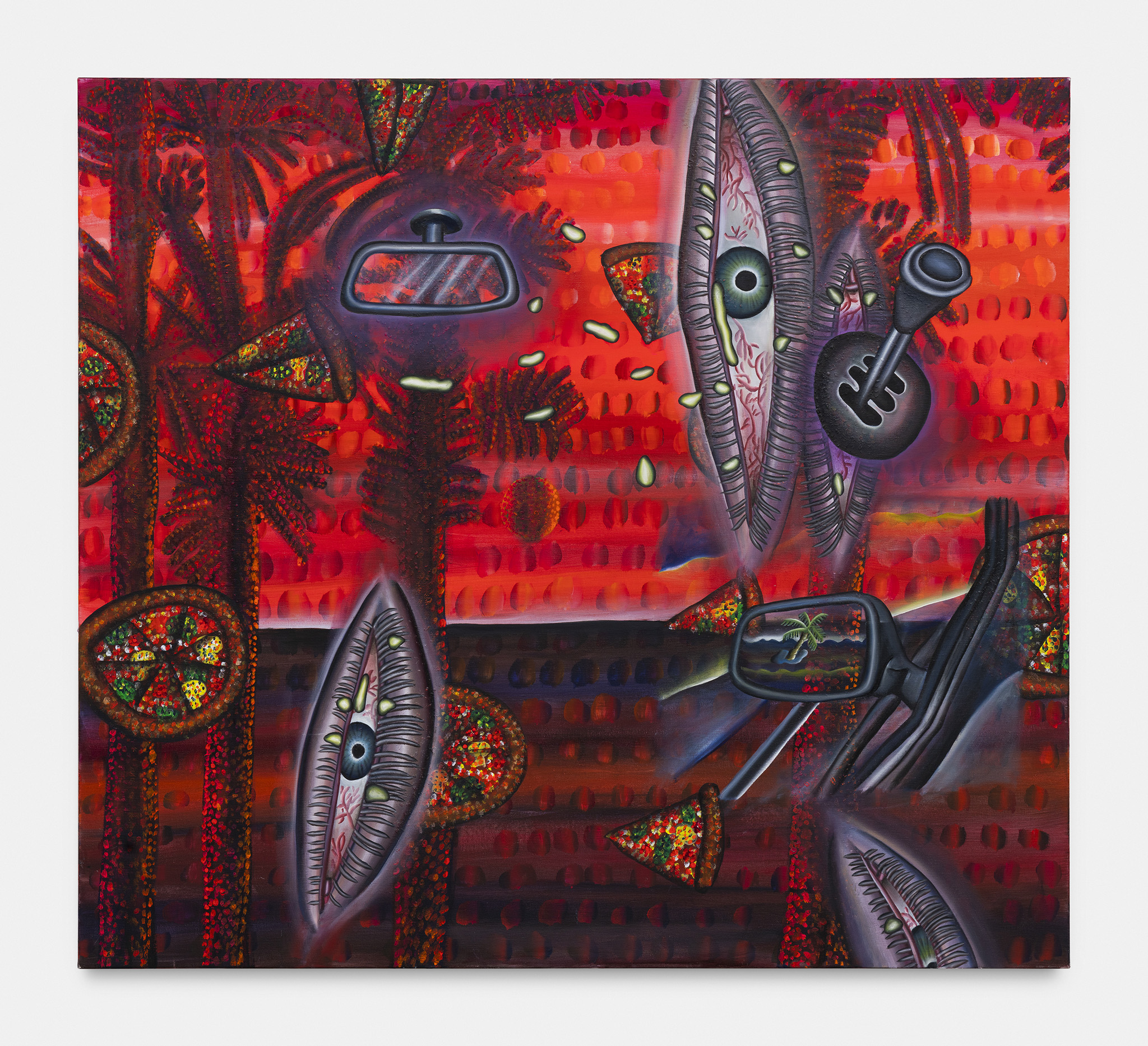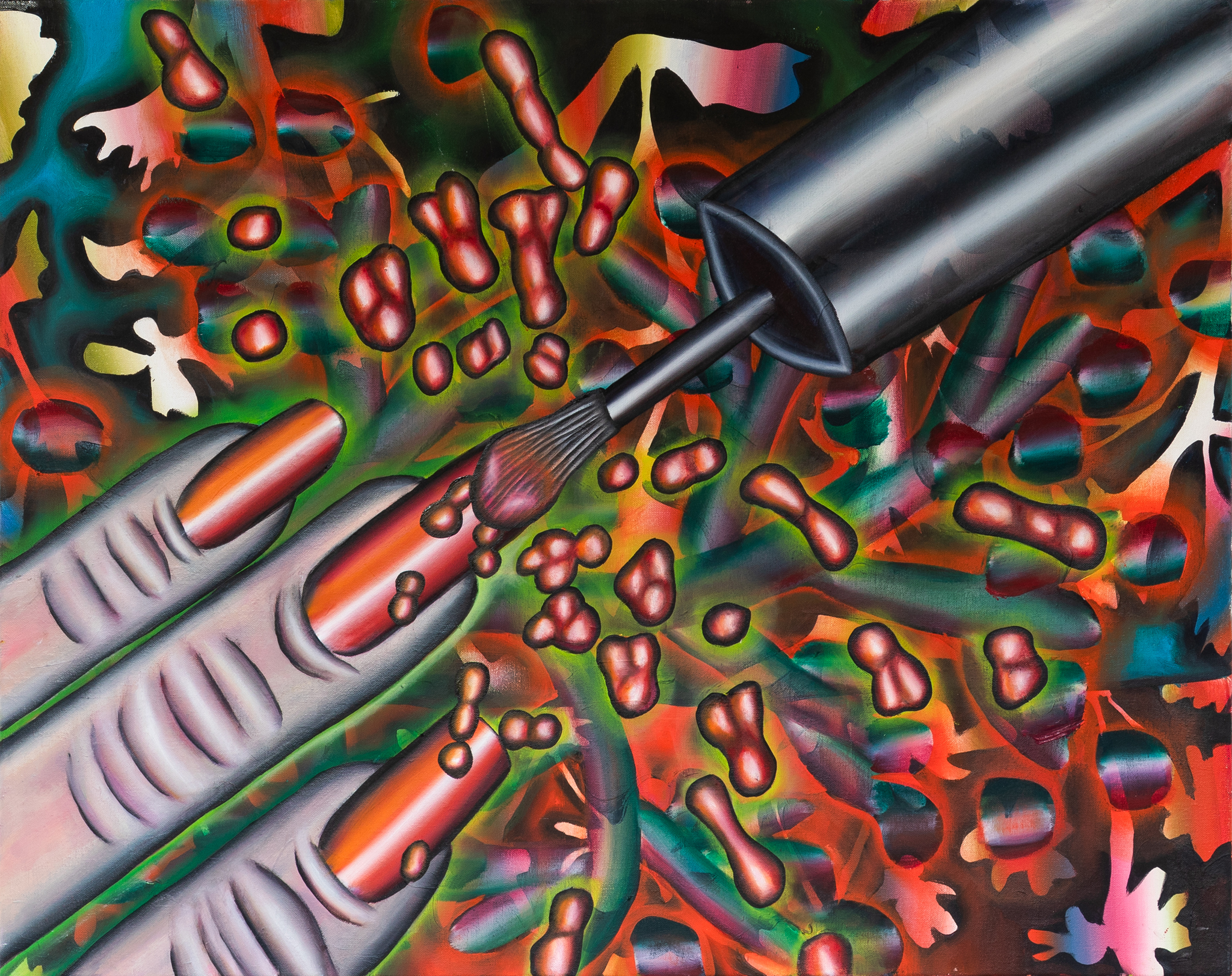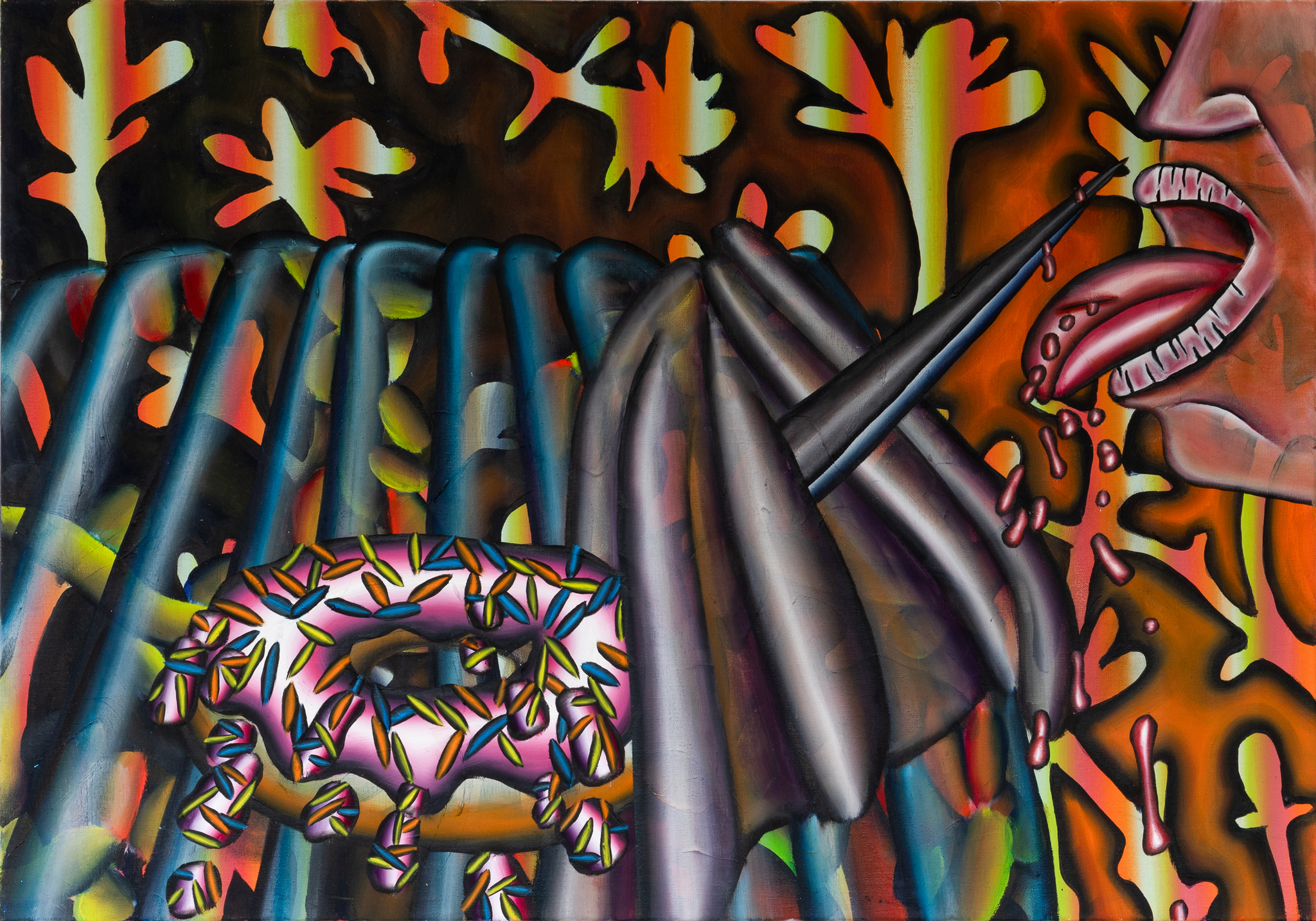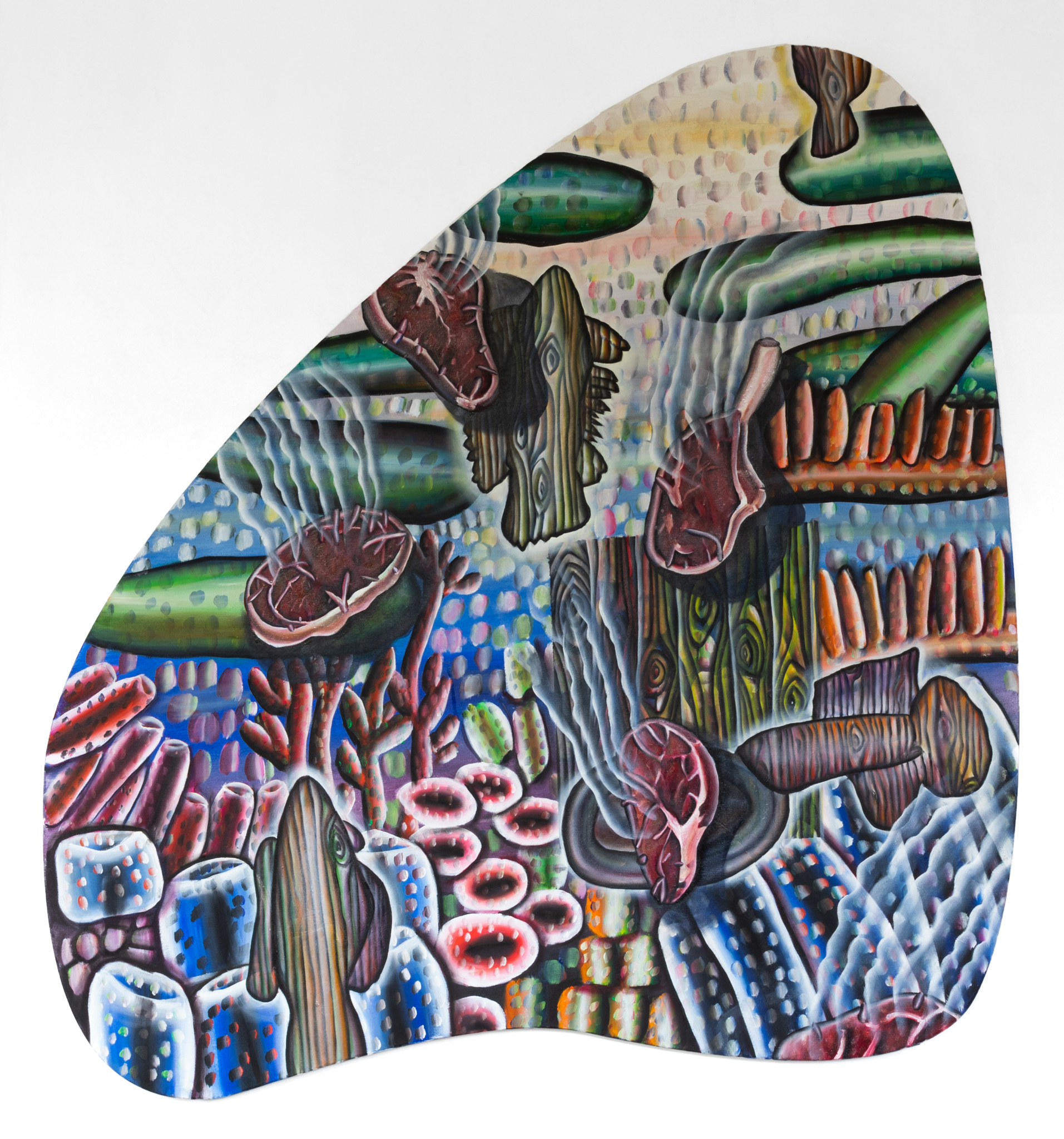Lisa Vlaemminck – Urschleim in silicon
Lisa Vlaemminck
Urschleim in silicon
| (Past) | 12.09.202412.09.24 — 26.10.202426.10.24 |
|---|---|
| (Gallery) | Rue de Livourne 35 Livornostraat |









(01/09)Exhibition views
In her third solo exhibition at rodolphe janssen, titled Urschleim in Silicon, Lisa Vlaemminck presents oil paintings on traditional rectangular canvases, as well as shaped canvases and a massive triptych. The paintings depict lacquered nails, raw pieces of meat, a bleeding human tongue, or naked pierced torsos connected by rings and chains, that disappear into nostrils where the chains vanish… the body is skewered, opened, dissected, and existing openings are connected to new ones, what’s inside wants to come out.
The compositions are set against backgrounds of bright and fluorescent colours that have a psychedelic feel: mushrooms, coral-like, and abstract shapes reminiscent of 1980s textile designs, or the environment of early video games in which evil bacilli take over the universe. The effect is reinforced in Poison Dart Bundle: Feeling Froggy in the Chimera Store, where a finger and a ‘gun’ are depicted in ‘POV’ – the personal perspective as used in video games – with potatoes floating in the background and something resembling an explosion. In other works, the background is a more graphic composition, an abstract setting that seems connected to what is happening in the foreground. The spaces become a kind of aquaria, where these torsos, noses, nails, and pieces of flesh float and are displayed weightlessly. This effect is heightened in the shaped canvases, where it feels as if one is looking through a peephole. The ‘gunk’ present in the works is reflected in the title of the exhibition: Urschleim in Silicon. The title is taken from an episode of the American science fiction series The X-Files. In the show, it refers to the ‘primordial slime’ from which all life is said to originate. However, the slime found in the series is not the authentic primordial soup, but counterfeit slime that has special powers. To quote protagonist Esther Nairn when analysing the slime: «One man alone has [with the Urschleim] achieved the equivalent of Copernicus, Magellan, and Darwin.» The essence of the world, hidden in a goo. The world’s code has been cracked to genetically radically manipulate it, so that the world will change forever. An analogy with painting arises: the painter finding the ‘primal code’ of painting – or perhaps the world – in a mash… For the artist, the title has a double meaning: on the one hand, it refers to the plastic and visceral that the title evokes; on the other, to the idea that paintings are parallel worlds.They have their own logic, where references and fragments feel recognisable and familiar, while meanings shift, and certainties are lost. The paint, that contributes to the meaning of the newly created image, is inseparable from the semantics of the depicted. Paint is first liquid, then solidifies with the image, immortalised.
Urschleim, like the amniotic fluid that eventually solidifies into the existence of things. In the paintings of Lisa Vlaemminck, the viewer is seduced with flesh and smooth torsos, but also with pimples, pus and open wounds. The seduction of the disgusting and the abject. The area where attraction and repulsion meet also seems, in part, the area where Lisa seeks her painterly motives. Involuntarily, thoughts of Marquis de Sade come to mind, the debauchery he displayed in his sexual escapades and how, in eroticism, he elevated vulgarity to great art. The marquis, who knew so many ‘beauties’ that no longer gave him pleasure, eventually found that his quest led him to a form of love that involved sheer perversity. The uglier, more toothless, and disgusting the marquis’ bed partners were, the more he was attracted to them. Disgust and attraction not as opposites, but as the driving force for discovering new worlds.
Lisa points out that such mechanisms are at play in her work, but that, in addition, an element of depersonalisation occurs. By isolating and magnifying everyday objects, these are lifted out of reality – a process that bears similarities to the use of images in advertisements or pop art. A certain alienation and even something uncanny occur when a donut, a knife, or a set of teeth is depicted on a gigantic scale and appears to fly through space like a comet. The image is not directly about that donut or teeth, but rather about the generation of meaning and the mechanisms of seduction. The transformation into the painting is accompanied by an abstraction in which individual features give way to general recognition. Body parts, foods, and objects are stripped of their physicality. Life is drained from the matter. The torsos look more like mannequins or pictures from a magazine than real male bodies. The object has become a motif and is appreciated in that way. Things are depersonalised until only form – or motif – remains. They become husks and prosthetics, flat images that take on new meaning when they encounter other objects and layers in the painting. Ultimately, the paintings of Lisa Vlaemminck go beyond a flirtation with the abject or popular culture. The viewer is seduced by something that might equally provoke disgust. Yet he looks and keeps looking, has a hunger for more. The spectator becomes a voyeur, while the painter is an exhibitionist or a ‘merchant’, who knows their merchandise but also their clientele. The painter extracts from the mash the urschleim, not the real primordial soup, but urschleim in silicon, which in its solidified form carries the secret of the world within it.
Godart Bakkers – 2024
Artworks
(08)-
![Lisa Vlaemminck, Pseudofolliculitis Barbae but make it Versace]()
(Artist) Lisa Vlaemminck (Title) Pseudofolliculitis Barbae but make it Versace (Year) 2024 (medium) Oil and acrylic on canvas (Dimensions) 165 x 180 cm
65 x 70 7/8 in(Reference) (LVla087) -
![Lisa Vlaemminck, Chain reaction of the gym rats]()
(Artist) Lisa Vlaemminck (Title) Chain reaction of the gym rats (Year) 2024 (medium) Oil and acrylic on canvas (Dimensions) 190 x 170 cm
74 3/4 x 66 7/8 in(Reference) (LVla086) -
![Lisa Vlaemminck, Waffle-Matrix]()
(Artist) Lisa Vlaemminck (Title) Waffle-Matrix (Year) 2024 (medium) Oil and acrylic on canvas (Dimensions) 79.3 x 105.3 cm
31 1/4 x 41 1/2 in(Reference) (LVla084) -
![Lisa Vlaemminck, A smile symphony: Trichophobia/Cosmic Cavity/Hot Dog Heist]()
(Artist) Lisa Vlaemminck (Title) A smile symphony: Trichophobia/Cosmic Cavity/Hot Dog Heist (Year) 2024 (medium) Oil and acrylic on canvas, three panels (Dimensions) 185 x 165.5 cm
72 7/8 x 65 1/8 in(Reference) (LVla082) -
![Lisa Vlaemminck, Lipos (ed)uction / as consciousness is harnassed to flesh]()
(Artist) Lisa Vlaemminck (Title) Lipos (ed)uction / as consciousness is harnassed to flesh (Year) 2024 (medium) Acrylic and oil on canvas (Dimensions) 130 x 145 cm
51 1/8 x 57 1/8 in(Reference) (LVla076) -
![Lisa Vlaemminck, ManiMania PediProdigy]()
(Artist) Lisa Vlaemminck (Title) ManiMania PediProdigy (Year) 2024 (medium) Oil and acrylic on canvas (Dimensions) 60 x 75 cm
23 5/8 x 29 1/2 in(Reference) (LVla089) -
![Lisa Vlaemminck, Lipos(ed)uction/ As Consciousness Is Harnassed To Flesh]()
(Artist) Lisa Vlaemminck (Title) Lipos(ed)uction/ As Consciousness Is Harnassed To Flesh (Year) 2024 (medium) Oil and acrylic on canvas (Dimensions) 60 x 85 cm
23 5/8 x 33 1/2 in(Reference) (LVla088) -
![Lisa Vlaemminck, Raw Meat Portal]()
(Artist) Lisa Vlaemminck (Title) Raw Meat Portal (Year) 2024 (medium) Oil and acrylic on canvas (Dimensions) 166.8 x 124.3 cm
65 5/8 x 49 in(Reference) (LVla085)
